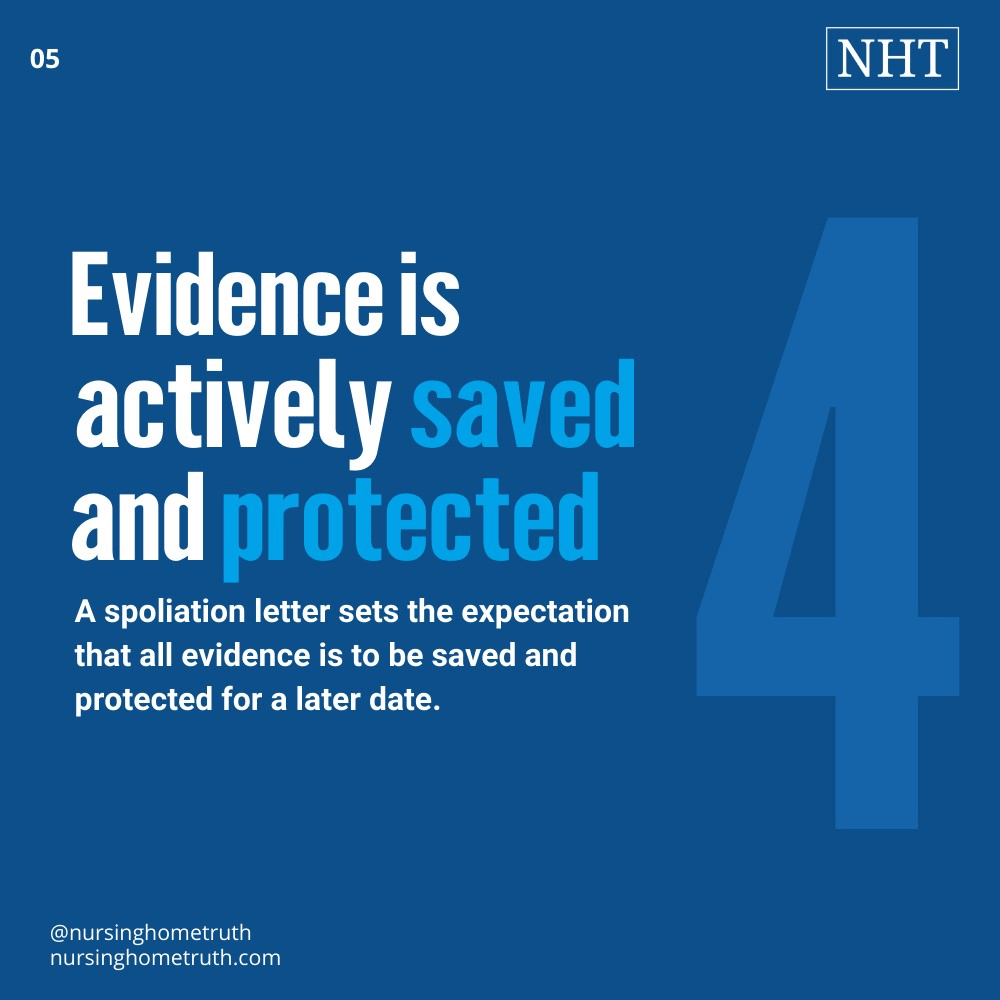Article Updated: February 3, 2022
Spoliation Letter for Preservation of Evidence
Letters telling potential defendants in a lawsuit to not destroy evidence have the following names, all of which are the same thing and serve the same purpose:
◊ Spoliation letter
◊ Preservation of evidence letter
◊ Preservation letter
◊ Evidence Preservation letter
I have fine tuned these letters over the past few years, and have used them to great effect in discovery and even trial.
Below, I’ll walk you through the basics of spoliation letters a/k/a preservation letters.
I’ll also provide you a preservation of evidence letter sample for vehicle accident cases and a preservation letter sample for a nursing home case.
Clickable Table of Contents
Spoliation Letter a/k/a Preservation Letter Basics
1 – Spoliation Letter Objectives
2 – Evidence Protected by Spoliation Letter
3 – Spoliation Letter Timelines
4 – Spoliation May be Intentional or Negligent
5 – Elements of Spoliation Claim
Preservation of Evidence Letter Sample
6 – Preservation Letter Sample for Auto Case
7 – Preservation Letter Sample for Nursing Home Case
8 – Preservation Letter Sample for Product Case
Resources
9 – Spoliation Letter Legal Help
10 – About the Author
11 – Legal Help in Maryland & Nationally
Spoliation Letter Objectives
The basic purpose of a preservation of evidence letter is to ensure the following objectives:
◊ Evidence is not tampered with
◊ Evidence is not intentionally destroyed
◊ Evidence is not auto-wiped
◊ Evidence is actively saved and protected
If crafted correctly, the spoliation letter will accomplish all of those goals.
Moreover, if done in a specific way, it will serve a purpose far beyond that, and will allow you to tell the jury that the defendant destroyed hurtful evidence.
Evidence Protected by Spoliation Letter
Clients often ask what evidence will be protected by a spoliation letter. The simple answer is, it depends on the case type and what the hot issues are in your case.
If you are looking for some sample lists of what type of evidence a spoliation letter will protect, jump down to the samples I have below.
There, you will find samples (with accompanying lists of particular types of evidence) for auto, product, and nursing home cases.
Spoliation Letter Timelines
A preservation letter must be mailed to the defendant immediately.
If you send it after the defendant has already destroyed the evidence, the letter may lose most if not all of its teeth.
For some cases, such as tractor trailer collisions, these letters should go out the same day as the collision if possible.
For other cases, such as medical malpractice cases, there is more of an art to when you send it, and different lawyers will have different opinions on when the letter should be mailed.
The letter itself should not have any timelines in it. It should simply refer to reasonably likely and impending litigation, which will be based on your investigation of the recipient as a potential defendant in a lawsuit.
Spoliation May be Intentional or Negligent
One of my preservation letter sample outlines below highlights this, that spoliation may be negligent or intentional.
In Maryland, the jury instruction acknowledges this:
MPJI-Cv 1:16
The destruction of or the failure to preserve evidence by a party may give rise to an inference unfavorable to that party. If you find that the intent was to conceal the evidence, the destruction or failure to preserve must be inferred to indicate that the party believes that his or her case is weak and that he or she would not prevail if the evidence was preserved. If you find that the destruction or failure to preserve the evidence was negligent, you may, but are not required to, infer that the evidence, if preserved, would have been unfavorable to that party.
If you can prove any measure of spoliation, it puts you in strong footing to improve the value of the case, regardless of whether the spoliation of evidence was intentional or negligent.
However, in some states, if you can prove the failure to preserve evidence was intentional, you may be allowed to pursue punitive damages.
Elements of Spoliation Claim
To establish spoliation of evidence, you must obviously send a preservation letter notifying the defendant of his obligations related to preservation of evidence.
Thereafter, if destruction of evidence becomes an issue, you must establish:
◊ A reasonably imminent lawsuit was likely
◊ The defendant had a duty to preserve evidence
◊ The evidence was destroyed
◊ The destroyed evidence was relevant to the claims being presented at trial
This is easier said than done, because there is often a speculation component involved.
If your preservation letter falls on deaf ears and important evidence goes missing, steps should be taken early on and throughout discovery to establish the need for a spoliation instruction.
I can tell you from experience, winning this one issue can turn the tide in a case and help you recover the justice you deserve.
Preservation Letter Sample for Auto Case
SPOLIATION LETTER
NOTICE TO PRESERVE AND MAINTAIN EVIDENCE
Dear DEFENDANT:
This firm represents CLIENT, the driver of the car you crashed into during the Collision. You are hereby advised of your legal obligation to preserve, maintain, prevent spoliation of, and not destroy any evidence which relates to the Collision.
Specifically, please ensure the preservation of the following evidence and avoid its spoliation in any way shape or form:
- Any pictures you took or have of the Collision scene;
- Any pictures you took or have of the vehicles involved in the Collision;
- Any repair estimate for any vehicle involved in the Collision;
- Any damage report for any vehicle involved in the Collision;
- Any recorded or written statements you gave to anyone concerning the Collision;
- Any information exchange or police report related to the Collision;
- Any photos you took of driver’s licenses, vehicle registration cards, persons, or any other item or thing that concerns the Collision.
With respect to spoliation of evidence and necessary preservation of evidence, please note that “[t]he destruction of or the failure to preserve evidence by a party may give rise to an inference unfavorable to that party.” MPJI-Cv 1:16 (Spoliation). Further, if the Jury finds “that the intent was to conceal the evidence, the destruction or failure to preserve must be inferred to indicate that the party believes that his or her case is weak and that he or she would not prevail if the evidence was preserved.” Id. If the Jury finds your failure to preserve the evidence was negligent, they may “infer that the evidence, if preserved, would have been unfavorable to” you. Id.
Please direct all communications in this matter to my attention. Thank you for your anticipated full cooperation in ensuring no spoliation of evidence occurs concerning documents or intangible evidence related to this collision.
Sincerely,
_________________________
Reza Davani, Esq.
Preservation Letter Sample for Nursing Home Case
SPOLIATION LETTER FOR PRESERVATION OF EVIDENCE
NOTICE TO SIGNATURE HEALTHCARE OF NORFOLK TO
PRESERVE AND MAINTAIN EVIDENCE
DO NOT DESTROY ANY VIDEOTAPE RECORDINGS AT YOUR FACILITY
This Spoliation Letter to Preserve Evidence is an attachment to my firm’s letter of August 26, 2021 wherein I place Signature Healthcare of Norfolk (the “Facility”) on notice that my firm is investigating the sexual assault of CLAIMANT at the Facility.
The below evidence is potentially relevant to the subject incident, for which I reasonably anticipate litigation may be imminent.
The Jury, and judge, have the right to see and evaluate this evidence. Please take all steps necessary to retain and keep all the following evidence in a safe and secure manner and location to ensure it is available for discovery:
- Pictures of the interior of the Facility, including of CLAIMANT’s room.
- Documents (electronic and paper) and all communications concerning policies and/or procedures regarding safety related matters in the Facility.
- Documents (electronic and paper) and all communications concerning the implementation of safety and monitoring of visitors in the Facility, to ensure they do not harm residents.
- Video surveillance for all floors, hallways, meeting areas, employee areas, rooms, nurse’s stations of the Facility during CLAIMANT’s residency therein.
- Video surveillance that shows any and all person entering and leaving the Facility during CLAIMANT’s residency therein.
- Business records kept in the ordinary course of business regarding CLAIMANT;
- Statements (paper, audio, and electronic) from any person concerning the care provided to CLAIMANT.
- Documents (electronic and paper) and all communications concerning/documenting any and all persons entering and leaving the Facility during CLAIMANT’s residency therein.
- All documents, communications, and correspondence that was sent to /provided to the State of Maryland or any governmental agency concerning assaults or sexual abuse at the Facility from January 1, 2010 to the present.
- The work schedule that identifies those persons (nurses, CNAs, /GNAs, etc.) who were assigned to work at the Facility during CLAIMANT’s residency therein.
- Any and all documents that pertain to any person who was not employed by you who came to your Facility to provide care for your residents during CLAIMANT’s residency therein. This would include any and all document pertaining to the hiring of independent contract nurses and contract CNAs, GNAs.
- Documents and all communications from any employees and staff wherein the employees and staff raised concerns that they were not able to provide adequate care to the residents at your Facility.
- Policies & Procedures related to patient/resident care at the Facility.
- MAR/TAR – Medication Administration Records and Treatment administration records during CLAIMANT’s residency in the Facility.
- Personnel files – employment applications, job descriptions, background checks, reviews, disciplinary action, salaries, schedules for all persons who provided care for, or directly interacted with, residents at the Facility, including CLAIMANT.
Your obligations of preservation extend beyond explicit non-destruction of the foregoing evidence. You have an obligation to prevent the destruction of the above listed evidence. This includes an obligation to share this notice with all persons or entities whose conduct may lead to inadvertent destruction or deletion of this evidence.
Sincerely,
___________________________
Reza Davani, Esq.
Preservation Letter Sample for Product Case
PRESERVATION OF EVIDENCE LETTER TO ANTICIPATED DEFENDANT
NOTICE TO PRESERVE EVIDENCE AND PREVENT SPOLIATION
Dear Sirs/Madams:
My firm represents CLIENT with respect to its purchase of COMPANY’s 30-Ton Cyber Grow Units (the “Units”). The COMPANY Units did not work as promised and cost CLIENT millions of dollars of damages and losses. CLIENT is pursuing legal claims for these losses, and litigation is reasonably anticipated and imminent. COMPANY must preserve, maintain, prevent spoliation of, and not destroy any evidence which relates to the Units and COMPANY sale of the Units to CLIENT.
The following evidence is relevant to this case. You should take all steps necessary to retain and keep electronic and paper versions/copies of all the following evidence to ensure the evidence is available for discovery:
- Marketing materials and videos for COMPANY’s products related to the cannabis industry;
- Advertising materials and videos for COMPANY’s products related to the cannabis industry;
- Research and development materials for COMPANY’s products related to the cannabis industry;
- Communications concerning COMPANY’s products related to the cannabis industry;
- Bulletins, product updates, recalls, and manufacturer notices concerning COMPANY’s products related to the cannabis industry;
- Internal investigation materials concerning COMPANY’s products related to the cannabis industry;
- All complaints sent to COMPANY by its customers concerning COMPANY ’s products related to the cannabis industry, to include voicemails and correspondence;
- All user manuals, package inserts, and product manuals concerning COMPANY’s products related to the cannabis industry;
- Documents and videos concerning design and development of COMPANY’s products related to the cannabis industry;
- Documents and videos containing policies and/or procedures regarding COMPANY’s products related to the cannabis industry;
- Documents and videos concerning COMPANY decision to get involved in the cannabis industry;
- Video surveillance related to any visit by CLIENT personnel to any COMPANY facility;
- Correspondence or any other documents and videos concerning CLIENT’s purchase or COMPANY’s sale of COMPANY products to CLIENT;
- Business records kept in the ordinary course of business regarding CLIENT’s use and complaints concerning COMPANY’s Units;
- Documents and videos containing or referencing reports, investigations, or internal reviews which concern CLIENT’s use and complaints concerning COMPANY’s Units;
- Statements (paper, audio, video and electronic) from any person concerning CLIENT’s use and complaints concerning COMPANY’s Units, or any of the items on this list.
- Results of any testing done of COMPANY’s products related to the cannabis industry before they were made available for sale;
- All pictures, photographs, drawings, or videos concerning COMPANY’s products related to the cannabis industry;
- Meeting minutes, shareholder reports, and employee training related documents concerning COMPANY’s products related to the cannabis industry.
Please direct all communications in this matter to my attention. Thank you for your anticipated full cooperation in forwarding this spoliation letter to all necessary persons and/or entities.
Sincerely,
__________________________
Reza Davani, Esq.
Spoliation Letter Legal Help
Propounding a spoliation letter in a personal injury case is absolutely one of those “don’t try this at home” type of things.
I’m providing preservation letter sample outlines above, but I did not divulge all my secrets in this article.
Just as important, I spent a good hour researching other lawyer articles on this topic, and literally none of them reveal key secrets.
While my article and samples are hands down more substantive and sharing more than most lawyers, it doesn’t replace the need for an actual lawyer.
If your case is serious enough for a spoliation letter, then it’s serious enough for a lawyer. Seriously, get professional help, because the insurance company already has it.
Warmly,
Reza Davani, Esq.
State Bar No.: #1212110211
Federal Bar No.: #30168
Cell phone: (301) 922-4598
Email: reza@nursinghometruth.com

Author Bio
About the Author
This nursing home and medical malpractice article was written by Baltimore, Maryland nursing home attorney Reza Davani, Esquire. Mr. Davani received his Juris Doctor degree from a Tier 1 law school, the University of Maryland Francs King Carey School of Law. He received his first license to practice law from the State of Maryland’s Court of Appeals (MD State License No. 1212110211), and just four months later received a federal law license from the United States District Court for the District of Maryland (Federal License No. 30168).
Mr. Davani has been practicing law for over 10 years. He began practicing law by helping clients as a sanctioned student lawyer before receiving his law license, and second chaired his first jury trial in federal court before even graduating law school. He is a registered member of the Maryland Association for Justice (MAJ), the American Bar Association (ABA), the American Association for Justice (AAJ), and was formerly on the MAJ’s Legislative Leader’s Circle.
Mr. Davani has taken over 20 cases to trial in state and federal court, and favorably settled well over 100 cases for injured victims. He has personally helped his clients recover over $15,000,000 in personal injury, medical malpractice, and nursing home abuse settlements and verdicts in Maryland and other states. He is dedicated to fighting for justice, and welcomes the opportunity to help you.
Medical Malpractice Nursing Home Abuse Lawyer Near You in Maryland & Beyond
I can help you anywhere in Maryland, including Allegany County, Anne Arundel County, Baltimore City, Baltimore County, Carroll County, Calvert County, Caroline County, Cecil County, Charles County, Dorchester County, Frederick County, Garrett County, Harford County, Howard County, Kent County, Montgomery County, Prince George’s County, Queen Anne’s County, Somerset County, St. Mary’s County, Talbot County, Washington County, Wicomico County, and Worcester County.
I have helped clients in over a dozen jurisdictions, including California, Delaware, District of Columbia, Georgia, Illinois, Iowa, Massachusetts, Maryland, Mississippi, New Jersey, New Mexico, New York, North Carolina, Pennsylvania, South Carolina, Washington, and Virginia.
I help injured victims nationwide in all 50 states on a case-by-case basis via Pro Hac Vice.









